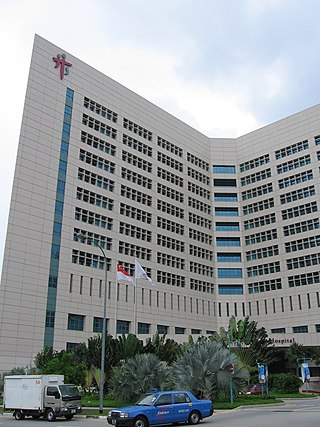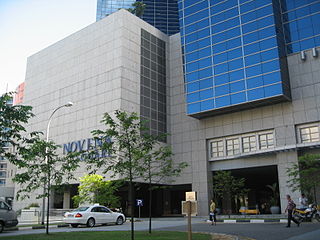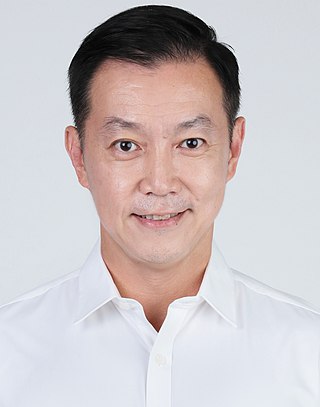
Tan Tock Seng Hospital is a tertiary referral hospital in Singapore, located in Novena. The hospital has 45 clinical and allied health departments, 16 specialist centres and is powered by more than 8,000 healthcare staff. Tan Tock Seng Hospital is Singapore's second-largest acute care general hospital with over 1,500 beds. TTSH has the busiest trauma centre in the country; 100 trauma cases are seen every day and 100 trauma surgeries are performed daily.

Singapore General Hospital (SGH) is an academic health science centre and tertiary referral hospital in Singapore. It is located next to the Bukit Merah and Chinatown districts of the Central Region, close to the Outram Community Hospital (OCH), which functions as a supplementary community and rehabilitation hospital to SGH for newly discharged patients. There is also the Outram Polyclinic to complement outpatient care. All of these institutions are operated by SingHealth, which comes under the purview of the Ministry of Health (MOH).

The National University Hospital (NUH) is a tertiary referral hospital and academic medical centre in Singapore, located in Kent Ridge. It is a 1,160-bed tertiary hospital serving more than 670,000 outpatients and 49,000 inpatients and serves as a clinical training centre and research centre for the medical and dental faculties of the National University of Singapore (NUS).

Novena is a planning area located within the Central Region of Singapore. Novena is bounded by Toa Payoh to the north, Bukit Timah to the west, Tanglin to the south and Kallang to the east. While Novena is not classified as a "new town" by the Housing and Development Board (HDB), the estate of Whampoa within the subzone of Balestier constitutes part of the Kallang/Whampoa New Town.

Novena MRT station is an underground Mass Rapid Transit (MRT) station on the North South Line. Located along Thomson Road in Novena, Singapore, the station is located near landmarks such as Tan Tock Seng Hospital, Mount Elizabeth Novena Hospital and United Square. Planned as part of Phase One of the MRT system, under the working name Thomson, the station's name was changed to Novena in November 1982, after the Novena Church. Construction of the station commenced in January 1984, and the station opened in December 1987.
The following lists events that happened during 2000 in Singapore.

Singapore Health Services, commonly known as SingHealth, is Singapore's largest group of healthcare institutions. The group was formed in 2000 and consists of four public hospitals, three community hospitals, five national specialty centres and a network of eight polyclinics. The Singapore General Hospital is the largest hospital in the group and serves as the flagship hospital for the cluster.
Mount Alvernia Hospital is a 319-bed general acute care hospital with tertiary medical capabilities and two multi-disciplinary medical specialist centres situated on Thomson Road, Singapore.

The National Healthcare Group (NHG) is a group of healthcare institutions in Singapore. The group was formed in 2000 and operates several hospitals, national specialty centers, and polyclinics. Tan Tock Seng Hospital is the largest hospital in the group and serves as the flagship hospital for the cluster.

The National Centre for Infectious Diseases, previously known as the Communicable Disease Centre, is a national public health institute under the Ministry of Health of Singapore. Located next to Tan Tock Seng Hospital in Novena, all patients within the city-state who are affected with a highly contagious disease are also quarantined at the NCID and is used to control an outbreak of such diseases. The executive director of the hospital is Professor Yee-Sin Leo.

Healthcare in Singapore is under the purview of the Ministry of Health of the Government of Singapore. It mainly consists of a government-run publicly funded universal healthcare system as well as a significant private healthcare sector. Financing of healthcare costs is done through a mixture of direct government subsidies, compulsory comprehensive savings, national healthcare insurance, and cost-sharing.

Singapore General Hospital (SGH) is Singapore's first general hospital and also its oldest and largest hospital. It is located along Outram Road, in the heart of a medical hub known as the Outram Campus (comprising several medical institutions including the Health Promotion Board and Health Sciences Authority). The hospital's history spans nearly two centuries and can be traced back to the British colonial era of 19th century Singapore.
Moulmein–Kallang Group Representation Constituency was a four-member Group Representation Constituency (GRC), comprising several city suburbs surrounding the Central Area of Singapore as well as a sizeable portion of the Central Business District. It existed from 2011 to 2015.

Cadi Scientific is a Singapore-based healthcare technology company that develops and markets wireless sensing and tracking devices base on active Radio-frequency identification (RFID) technology for healthcare institutions. Cadi Scientific is known in the Singapore Healthcare market for its Cadi SmartSense System that is designed for tracking patients' real-time locations for automating workflow as well as monitoring patients' temperatures automatically to reduce nurses' workload.
Assisi Hospice is a hospice in Singapore which provides palliative care to terminally ill patients.
Foo Hai Ch'an Monastery, is a Buddhist monastery in Singapore. The monastery was set up by Venerable Hong Zong of Taiwan and the current abbot is Venerable Shi Ming Yi. The present premises are located at Geylang East Avenue 2, Singapore.

Lim Wee Kiak is a Singaporean politician and ophthalmologist. A member of the governing People's Action Party (PAP), he has been the Member of Parliament (MP) representing the Canberra division of Sembawang GRC since 2006.

Ernest Steven MonteiroBBM PJG FRFPS was a Singaporean physician, specialised in preventive medicine. He also served as the Singapore Ambassador to Brazil, Cambodia and the United States.
James Mark Jeyasebasingam Supramaniam was a doctor, public administrator, research clinician and the first Chairman of the Singapore Medical Research Council, WHO Fellow, and acknowledged world expert on tuberculosis, with Sir John Crofton and Wallace Fox.
















